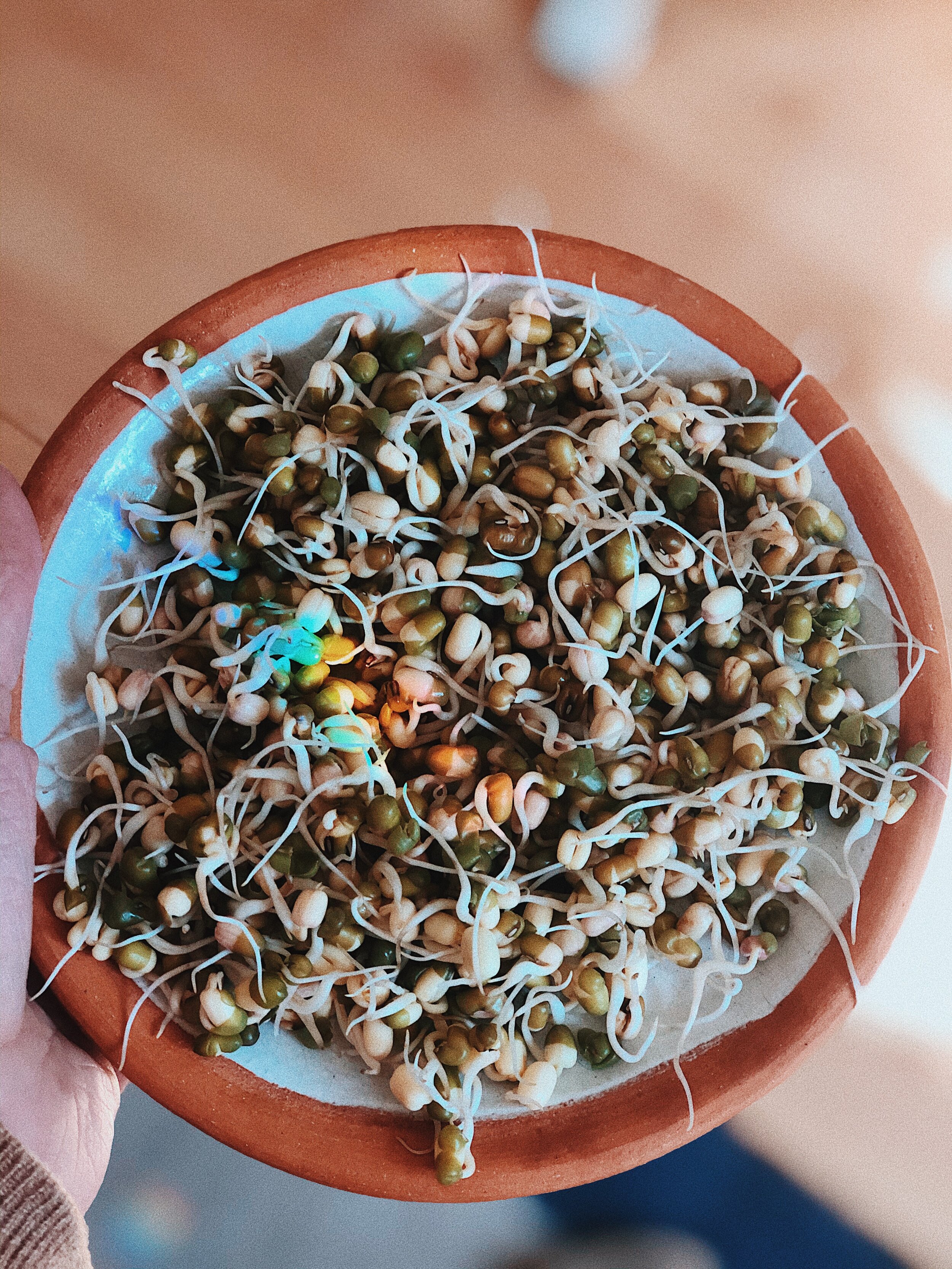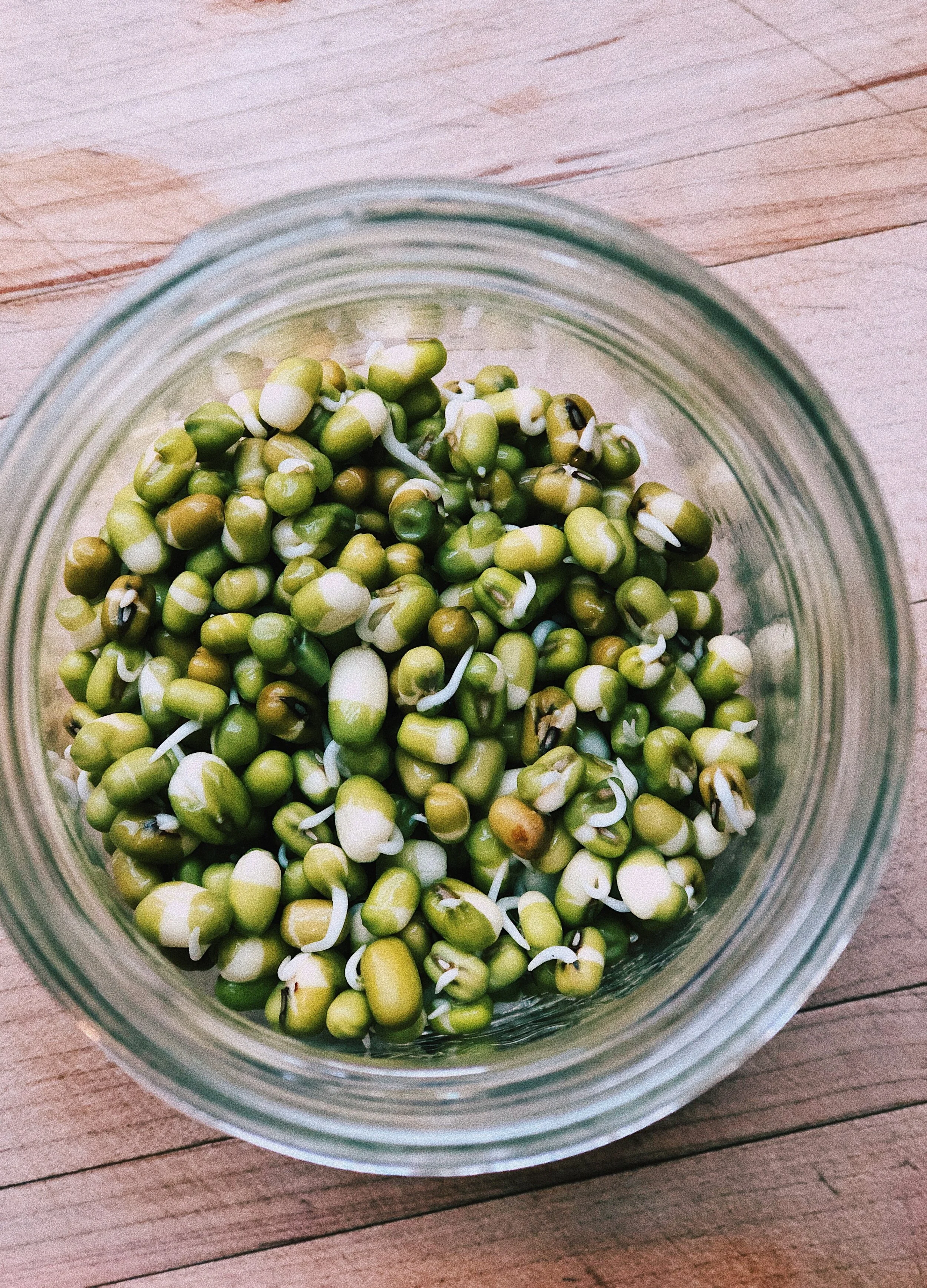A Simple Guide to Sprouting
make your own beautiful, magical mung bean sprouts!
While being in self-isolation at home during this global pandemic, I have channeled my energy and turned my kitchen into a makeshift laboratory. Currently I have several projects in the midst including a sourdough starter, a batch of sauerkraut and a few jars of sprouts coming into their own.
While not everyone has the time or interest to devote to these projects I thought it would be fun to share a simple guide on sprouting. It’s so easy and requires very little materials, maintenance or effort. It’s fun to watch these tiny seeds come alive and to top grain bowls, sandwiches and salads with them. Join me and start your own sprouting adventure!
First off, What are sprouts?
Sprouts are essentially seeds in a transition phase to a new plant. With the right care and conditions, these small seeds begin to germinate and grow into a new, living plant. You can use seeds from various plant based foods like vegetables, legumes, grains, nuts, and seeds but I find the easiest for beginners is legumes like lentils, mung beans and chickpeas.
Do I need any special materials?
No, not particularly. I always use a glass jar, fine mesh strainer, piece of cheesecloth or cotton and an elastic band. That’s it, I suggest using what you have when starting out and making small amounts of sprouts. Once you become a master, consider investing in professional grade materials. These sprouting kits work best for smaller seeds like alfalfa and radish.
I do recommend using organic legumes instead of conventional when possible as conventionally grown seeds are often irradiated, making them difficult or impossible to germinate and sprout.
Benefits of Sprouts
Improved Digestibility : Sprouts contain an unusually high number of enzymes. These enzymes help boost various metabolic processes and chemical reactions within the body, specifically when it comes to digestion.If you have difficulty digesting particular grains or legumes, try having them soaked or sprouted. This usually helps to improve your symptoms.
Nutrient Density: Sprouts are powerful! They can contain up to 12X more nutrients than their fully grown counterparts and because of their high enzyme content, they have more bioavailable nutrients like protein and minerals. They are a great way to easily increase your daily nutrient intake.
mung bean sprouts day 2
Sprouted Mung Beans
I have found mung beans to be the easiest legume to sprout and would highly recommend using them if you are a beginner, they are basically foolproof! Feel free to use this guide for other legumes as well like lentils, chickpeas, adzuki beans or whatever your heart desires.
Materials
Makes 1.5 cups of sprouts
3 Tbsp organic mung beans
1 16oz glass jar ( a standard mason jar works perfectly)
A fine mesh sieve
A small piece of cotton or cheese cloth ( make sure it covers the opening of your jar)
Rubber band
Directions
1. To start, transfer your dried beans into the glass jar and cover with water, you will want 2-3x more water than beans in the jar. Cover and leave beans on the counter in a cool dry place to rehydrate for 8h or overnight.
2.The next day you should notice the beans have doubled in size. Using your sieve, drain the beans and rinse under cold water, shake the beans to remove any excess water and wash the jar thoroughly before transferring the beans back. Cover the beans using your cloth and rubber band and set on your countertop.
3.Repeat step 2 once per day for the next 3-4 days and watch your sprouts grow! I like to keep them sprouting for 5 days until they are quite large but they are edible at around day 3.
Each day examine your sprouts thoroughly, look to see if there is any discolouration, feel for slime or unusual texture and smell for any pungent or mouldy smells. If you experience any of these, dispose of your sprouts in the compost and try again. Chances are the jar or beans are too wet, so be sure to be mindful of draining your beans thoroughly each day.
4.Once fully sprouted, seal your sprouts in an airtight container in your fridge for up to 5 days. Enjoy theses sprinkled on to your favorite salads, grain bowls and sandwiches.


